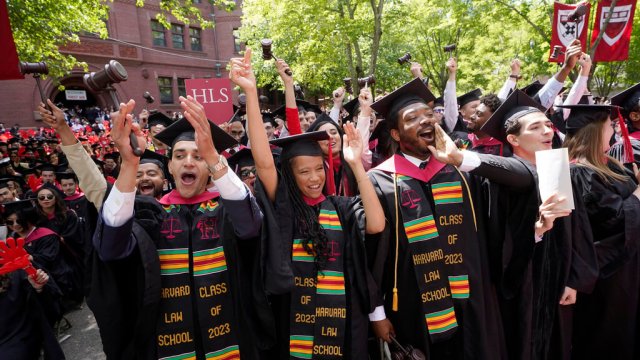A near decade-long battle over whether race should be considered when colleges decide which students to admit — a practice known as affirmative action — is now on the cusp of being decided in the U.S. Supreme Court.
"We believe that a student's race should not be used to help them or harm them in seeking admission to any college or university in the country," said Edward Blum, President and Founder of Students for Fair Admissions (SFFA).
In 2014, Blum sued Harvard College and the University of North Carolina.
He said a race-conscious admissions process puts Asian American students at a disadvantage while accepting less qualified white, Black, and Latino students.
"When you go to apply for a job, your race or your ethnicity shouldn't be used as something that is going to be used to reject you or to accept you. Same thing with higher education. The bar cannot be raised or lowered for individuals because of the accident of their birth," said Blum.
Blum said over the years, he's talked to Asian American students, like Calvin Yang, a Harvard applicant, who believe they were denied access to elite schools because of a quota system that left high-performing Asian high schoolers out to ensure a diverse student body.
SEE MORE: Ivy Day 2023 a rough one as Harvard, Columbia admit less than 4%
"I think the fact that I'm Asian American plays a pretty big factor into why I was rejected. I think admission officers definitely have — I don't know for sure — but either hard or soft quota on the number of incoming Asian students into the Harvard class of 2025," said Yang.
Scripps News reached out to Harvard, but they declined to comment for this story. But its website said it considers many factors and "does not discriminate against applicants from any group in its admissions processes."
Niyati Shah with Asian Americans Advancing Justice (AAJC) agrees with Harvard’s admissions process.
"Race-conscious admissions policies help all Americans, and they also overwhelmingly help Asian Americans," said Shah. "It's not about admitting underqualified students. It's picking the best composition of qualified students that will create a safe, diverse campus life for everybody."
Harvard student Tarina Ahuja is concerned that if the justices rule against the universities, students of color will feel isolated.
"Getting to find community, getting to find people that are of your identity, that are not of your identity, getting to learn from one another — that is so beautifully important. It's something that's so necessary to our education," said Ahuja.
A 2019 Pew Research survey found the majority of Americans believe race should not be a factor in college admissions, but some say it's impossible to overlook.
"You can't ignore the elephant in the room. I think race is always central to the conversation, and to pretend that it's not, it's just true," said Bethany Li of the Asian American Legal Defense and Education Fund.
Harvard has vigorously pushed back against the allegations and said it considers a wide range of factors, including academic accomplishments and personal qualities, when choosing which students to admit.
Trending stories at Scrippsnews.com




